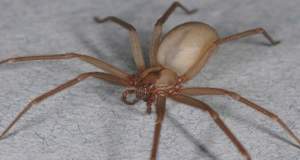
What's in this article?
Deadly Spider Bites
 Spider bites, sometimes called arachnidism in technical literature, is injury resulting from the bites of spiders. It is an unusual class of injury and the effects of most confirmed spider bites are trivial, even though nearly all species of spider are venomous. For all practical purposes arachnidism is substantial envenomation by a spider bite, their bites otherwise being medically insignificant.
Spider bites, sometimes called arachnidism in technical literature, is injury resulting from the bites of spiders. It is an unusual class of injury and the effects of most confirmed spider bites are trivial, even though nearly all species of spider are venomous. For all practical purposes arachnidism is substantial envenomation by a spider bite, their bites otherwise being medically insignificant.
Though many people are afraid of spiders, they rarely bite people unless threatened. Most spider bites are harmless. Occasionally, spider bites can cause allergic reactions. And bites by the venomous black widow and brown recluse spiders can be very dangerous to people.
Black Widow
The black widow spider is shiny and black with a distinct, reddish hourglass-shaped mark on its belly. Found mostly in the warm southern and western states, the black widow likes hidden spaces. It will often lurk under fallen leaves, in woodpiles, and under boxes in the attic. If you run into one of their webs, you could suffer a bite.
If you suspect a black widow bite, look for two puncture marks on the skin that cause pain and burning. Other symptoms include cramping stomach pain, headache, weakness, muscle rigidity, sweating, and more. Prompt treatment is best, especially for children.
 Brown recluse
Brown recluse
You can identify this spider by the violin-shaped marking on its back. The bite produces a mild stinging, followed by local redness and intense pain within eight hours. A fluid-filled blister forms at the site and then sloughs off to leave a deep, enlarging ulcer. Reactions from a brown recluse spider bites vary from a mild fever and rash to nausea and listlessness. On rare occasions death results, more often in children.
Identifying Spider Bites
Identifying a spider bites is easier if you saw what bit you, but sometimes you may not notice the wound until hours later. Look for things like swelling, a “red welt,” and skin damage, as well as any troubling symptoms that accompany the bite.
Spider bites often take longer to heal than other insect bites, and may affect skin tissues. It is important to keep the bite clean to reduce the risk of infection.
If you experience other symptoms such as fever, chills, stomach upset, rash, headaches, swelling, anxiety, or swollen lymph glands speak with your doctor right away.
Spider Bites Symptoms
Determining whether a victim has been bitten by a spider may be impossible. Studies of brown recluse spiders suggest that victims seek treatment more than three days after their bites, making it nearly impossible to identify the culprit. Black widow bites are often identified only by symptoms of its venom, without any visible local bite.
Local reactions to bites from all kinds of toxic bugs look the same:
♦ redness
♦ swelling
♦ itching
♦ pain
Victims should be concerned when a local reaction continues to get worse for more than 24 hours. Look for redness spreading away from the bite, drainage from the bite, increase in pain, numbness/tingling, or a discolaration around the bite that looks like a halo or bullseye.
What should you do if you are bitten by a spider?
♦ Wash the site of the spider bites well with soap and water.
♦ Apply a cool compress or ice pack over the spider bites location.
♦ Over-the-counter pain relievers may be used to relieve symptoms. (Remember, do not give aspirin to children; use acetaminophen or ibuprofen instead).
♦ Call the doctor or seek emergency treatment if the victim is a young child, if you think the bite may have been from a black widow or brown recluse spider, if any signs of an allergic reaction occur, if the bite area becomes infected, or if the victim develops a rash or severe illness.
♦ If possible, retrieve the spider and bring it with you to the health care practitioner so that it can be definitively identified.
♦ A tetanus booster shot may be necessary, depending upon the date of the patient’s last immunization.





